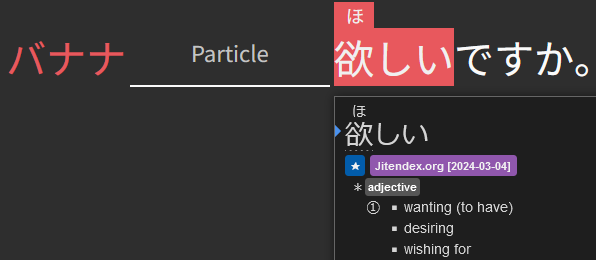About a month ago I came back to learning Japanese after around a decade away, I have effectively started fresh, and while I have some understanding I still struggle with the nuance around the fundamentals.
Today, I ran into this in my review queue, and despite being quite a simple sentence it has caused me a tremendous amount of confusion:
Not knowing the word「欲しい」, I looked it up:
Okay, so we’ve got one or more bananas, there is a want or desire, and it’s a question. From this I immediately understood the intended English translation of the sentence, bananas + want narrows it down to a handful of options, and finally it being in the form of a question implies the asking of another person, (i.e. It’s probably “Do you want a banana(s)?” or “Do you want a/the banana?”).
However, when it came to choosing the “correct” Japanese particle I was still at a loss. Is it
- 「(あなたが)バナナを欲しいですか」i.e. Do you have a desire which acts upon this banana?
- 「(あなたが)バナナに欲しいですか」i.e. Do you have a desire for which a banana is the target?
- 「(あなたが)バナナは欲しいですか」i.e. Do you, regarding bananas, have desire?
- 「(あなたは)バナナが欲しいですか」i.e. For you, does the banana have the quality of being desired?
I tried all of these (in that order), only looking at the hints once the fourth was accepted.
Now, while reading this hint would likely have caused me to pick が over は (if I had already narrowed it down to those two), I don’t think it would have prevented me from trying my first two answers. In fact, reading over the page for が once more I’m struggling to find any mention of anything close to “single pieces of information” or “stand out”, are these meant to just be coy ways of referring to the word subject or am I missing something deeper?
So, where’s the issue here? Is it the hint, my understanding of grammar, or my vocabulary (specifically 欲しい), perhaps even a little of all? Are all of my sentences (and my literal interpretations of them) correct, and if not, what are the issues? How can you tell which “direction” an adjective applies, i.e. is A wanted by B or does A want B?
This has also made me realise that my understanding of certain areas may be quite a bit better or worse than an on-the-face-of-it reading of the reviews would suggest, as I believe that my understanding of particle in question (が) is pretty solid, but my first two answers would be wrong for reasons that appear to relate more to the use of an adjective. Meanwhile, reviews on similar adjectives have often (to my recollection) been as trivial as to just copy the word provided into the empty space.




